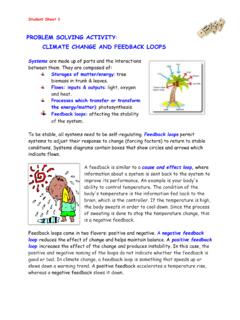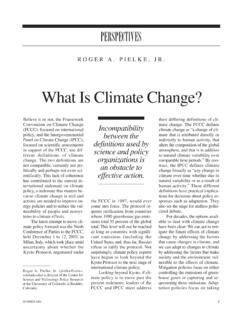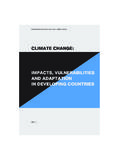Transcription of Impacts of Climate Change on the Environment
1 Impacts of Climate Change on the Environment : Mitigation and Adaptation Liao Department of Environmental Engineering Texas A&M University- University-Kingsville 63% of Americans believe that global warming is happening The Intergovernmental Panel on Climate Change (IPCC). Climate Change or Global Warming? Climate Change refers to any significant Change in measures of Climate (such as temperature, precipitation, or wind) lasting for an extended period (decades or longer). Global warming is an average increase in the temperature of the atmosphere near the Earth's surface. National Academy of Sciences: "the phrase ' Climate Change ' is growing in preferred use to 'global warming' because it helps convey that there are [other] changes in addition to rising temperatures.
2 Causes of Climate Change Natural factors, such as changes in the sun's intensity or slow changes in the Earth's orbit around the sun;. Natural processes within the Climate system ( changes in ocean circulation);. Human activities that Change the atmosphere's composition ( through burning fossil fuels) and the land surface ( deforestation, urbanization, etc.). IPCC AR4 Simulations (from 13 different Climate models from around the world). IPCC AR4 Simulations (from 13 different Climate models from around the world). Projections of Climate Change (IPCC, 2007). greatest over land & at most high N latitudes and least over the south, Ocean & parts of the N. Atlantic Ocean Ken Salazar, Secretary of the Interior, December 10, 2009.
3 Climate Change is affecting every corner of the American continent. It's making droughts drier and longer, floods more dangerous, and hurricanes more severe.. Global Impacts of Climate Change Future Climate Impacts on Freshwater IPCC, WG2, 2007. Human Responses to Climate Change Mitigation: Actions to reduce greenhouse gas emissions. Adaptation: Actions by individuals or systems to avoid, withstand, or take advantage of current and projected Climate changes and Impacts . Stern Review 2006. Strong action is needed urgently US GHG Emissions Potential for Climate Change Mitigation Market potential is the mitigation potential based on private costs and private discount rates. Economic potential is the amount of GHG mitigation, which takes into account social costs and benefits.
4 Technical potential is the amount by which it is possible to reduce GHG emissions by implementing a technology or practice that has already been demonstrated. Mitigation Options for Energy Sector Sectoral Economic Potential for Global Mitigation IPCC, WG3, 2007. Cumulative Emission Reductions for Alternative Mitigation Measures IPCC, 2007. Earth-Engineering for Climate Change Mitigation Keith, David, 2001: Geoengineering, Nature, 409, 420. Stratospheric Geoengineering Benefits Risk 1. Cool planet 1. Drought in Africa and Asia 2. Reduce or reverse sea ice melting 2. Continued ocean acidification 3. Reduce or reverse ice sheet melting 3. Ozone depletion 4. Reduce or reverse sea level rise 4. No more blue skies 5.
5 Increase plant productivity 5. Less solar electricity generation 6. Increase terrestrial CO2 sink 6. Degrade passive solar heating 7. Environmental impact of implementation 8. Rapid warming if stopped Robock, Alan, 2008: 20 reasons why geoengineering 9. Cannot stop effects quickly may be a bad idea. Bull. Atomic Scientists, 64, No. 2, 14- 10. Human error 18, 59, 11. Unexpected consequences 12. Commercial control 13. Military use of technology 14. Conflicts with current treaties 15. Whose hand on the thermostat? 16. Ruin terrestrial optical astronomy 17. Ruin stargazing 18. Ruin satellite remote sensing But is mitigation the only solution to Climate Change ? No! Adaptation Since Climate Change is inevitable and some degree of the changes will occur and affect the Environment regardless of future mitigation of Climate Change , some actions should be taken in order to minimize the Climate -induced risks to the Environment , human health, society and economics.
6 Such reactions are usually called adaptation and they are defined as the adjustments in natural or human systems in response to actual or expected climatic stimuli or their effects, which moderates harm or exploits beneficial opportunities (IPCC, 2007). Adaptation Planning Process NRC, 2010. Key Factors for Adaptation Capacity Adaptive Capacity: A system's inherent ability to adapt to Climate Change Impacts . Adaptation Research Adaptation to the Climate Change effects has been widely discussed and focused on: Agriculture (Howden et al., 2007; Karing et al., 1999; Mendelsohn and Dinar, 1999). Water Resources (de Loe et al., 2001; Dessai and Hulme, 2007). Ecosystems (Richards et al., 2008; Vos et al., 2008).
7 Human Health (Ebi and Burton, 2008). Example of Adaptation Initiatives Adaptation Options to Climate Change Impacts on Agriculture (IPCC, 2007). Increases in drought and flood frequency are projected to affect local crop production negatively Warmer and more frequent hot days and nights will increase insect outbreaks impacting agriculture, forestry and ecosystems. In many African regions, area suitable for agriculture, the length of growing seasons and yield potential are expected to decrease. In drier areas of Latin America, Climate Change could lead salinization and desertification of agricultural land. Productivity of important crops is projected to decrease and livestock productivity to decline. Adaptation Strategies of Agricultural Sectors to Climate Change Changing planting dates (March -> Feb or Jan).
8 Planting different varieties or crop species Development and promotion of alternative crops Developing new drought and heat-resistant varieties Better pest and disease control for crops;. Implementing new or improving existing irrigation systems (Reducing water leakage, soil moisture conservation - mulching);. US Climate Change Adaptation Budgets Climate Change Adaptation, Highlights of Departmental Interior, 2010. Taking action on Climate Change and improving air quality DOE's Strategic Plans NOAA's Next-generation Strategic Plans The Copenhagen Accord In December 2009, The United Nations Climate Change conference (COP15) in Copenhagen ended with an agreement, The Copenhagen Accord, which recognizes the importance of a two-degree increase in global temperatures for staving off the worst effects of Climate Change .
9 According to The Copenhagen Accord, developed countries commit to a goal of mobilizing jointly US$100. billion a year by 2020 for developing countries to adapt to the environmental consequences of Climate Change ( ). Proposal title: Development of an Air Pollution Alert System: Integrating an Air Quality Forecasting Model and Location-aware Mobile Devices Traditional ways: air pollution alerts are delivered to the public in three ways: 1) internet posting; 2). emails; and 3) broadcasting through media. New approach: Integrating location-aware mobile devices into air quality alert systems Smartphone Users Air Quality Forecasting Pollution concentration (x,y,t). Air Pollution Internet Alert















